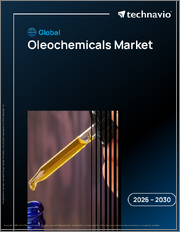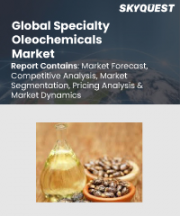
|
시장보고서
상품코드
1642546
올레오케미컬 시장 보고서 : 유형별, 형태별, 용도별, 원료별, 지역별(2025-2033년)Oleochemicals Market Report by Type, Form, Application, Feedstock, and Region 2025-2033 |
||||||
세계의 올레오케미컬 시장 규모는 2024년에 273억 달러에 달했습니다. 향후 IMARC Group은 시장이 2033년까지 459억 달러에 달하며, 2025-2033년에 5.46%의 성장률(CAGR)을 보일 것으로 예측하고 있습니다. 바이오 기반 스킨케어에 대한 수요 증가와 함께 지속가능성 유지에 대한 환경 의식의 향상이 주로 시장을 촉진하고 있습니다.
올레오케미컬은 주로 동식물에서 추출한 천연 오일과 지방에서 추출한 화학물질입니다. 이들은 지방산, 글리세린, 지방 알코올 및 에스테르로 제공되며, 오일과 지방에 함유된 트리글리세라이드의 가수분해 및 에스테르화 등 다양한 화학적 과정을 통해 얻을 수 있습니다. 이들은 지속가능하고 환경 친화적이며 환경 오염을 줄이는 만능 화합물입니다. 그 결과, 올레케미칼은 전 세계 화장품, 의약품, 비누, 세제, 플라스틱, 고무, 제지 산업에서 광범위하게 사용되고 있습니다.
현재 다양한 스킨케어 및 의약품 제제에서 글리세린의 사용이 증가하고 있으며, 이는 시장 성장을 지원하고 있습니다. 여기에 세제 및 유화제에 사용되는 계면활성제의 필수 컴포넌트로 사용되는 지방산의 사용이 증가하면서 시장 성장에 힘을 실어주고 있습니다. 또한 다양한 산업에서 석유 기반 화학 물질에 대한 대체품을 빠르게 찾고 있으므로 석유 화학 물질에 대한 수요가 증가함에 따라 시장에 긍정적인 영향을 미치고 있습니다. 이와는 별도로, 건강하고 자연적인 성분에 대한 개인들의 관심이 높아지면서 업계 투자자들에게 유리한 성장 기회를 제공합니다. 또한 기존 석유화학제품에 비해 비용 효율성이 높은 올레케미칼에 대한 선호도가 높아지면서 시장 성장에 기여하고 있습니다. 이와 함께 전 세계에서 다양한 원료를 사용할 수 있다는 점도 시장 성장을 가속하고 있습니다.
석유화학 시장 동향/촉진요인:
지속가능성 유지를 위한 환경 문제 증가
지속가능성을 유지하기 위한 개인들의 환경에 대한 관심이 높아지면서 시장 성장에 힘을 실어주고 있습니다. 급격한 기후 변화와 환경 악화로 인해 사람들은 지속가능한 제품을 선호하게 되었습니다. 또한 올레케미칼은 지속가능하고 환경 친화적인 대체품으로 다양한 분야에서 빠르게 활용되고 있습니다. 이와는 별도로 석유화학제품은 재생한 자원, 주로 천연 오일과 지방을 원료로 하므로 석유화학제품에 비해 생분해성이 높고 환경에 덜 해롭습니다. 이는 이산화탄소 배출량을 줄이고 친환경 기술을 채택하는 추세와 일치합니다. 또한 소비자들의 환경 의식이 점점 더 높아지면서 생태계에 미치는 영향을 최소화한 제품을 적극적으로 찾고 있습니다.
바이오 제품에 대한 수요 증가
전 세계 대중들의 바이오 제품에 대한 수요가 증가하면서 시장 성장을 촉진하고 있습니다. 소비자들의 환경에 대한 인식이 높아지면서 바이오 제품을 선호하는 경향이 강화되고 있습니다. 이에 따라 일상 생활에서 천연 소재와 바이오 대체품을 선호하는 사람들이 증가하고 있으며, 이는 시장 성장을 지원하고 있습니다. 올레오케미컬은 식물에서 추출한 생분해성 제품으로 인체에 해를 끼치지 않습니다. 이와는 별도로, 천연 성분을 함유한 보습제, 연화제 등 화장품 및 퍼스널케어 제품에 대한 수요가 증가하고 있습니다. 마찬가지로 바이오 계면활성제는 환경 친화적인 세정액을 선호하는 소비자들에게 널리 사용되고 있습니다.
재생 화학물질에 대한 정부의 구상
각국 정부는 이산화탄소 배출량을 줄이기 위해 환경 기준에 대한 엄격한 규제와 정책을 시행하고 있습니다. 또한 유해 가스를 배출하지 않는 바이오 및 재생한 화학 물질의 채택을 장려하는 몇 가지 구상을 취하고 있으며, 시장 전망은 양호합니다. 이에 따라 제조업체가 지속가능한 관행을 채택하도록 장려하기 위해 세제 혜택, 보조금, 의무화 등 다양한 조치가 종종 시행되고 있습니다. 이와는 별개로, 올레케미칼은 환경 친화적이고 생분해성이 있는 것으로 알려져 있으며, 이러한 엄격한 규제에 부합하는 적절한 솔루션입니다. 또한 안전하고 자연적인 제품에 대한 소비자 수요가 증가함에 따라 시장 성장을 가속하고 있습니다.
목차
제1장 서문
제2장 조사 범위와 조사 방법
- 조사의 목적
- 이해관계자
- 데이터 소스
- 1차 정보
- 2차 정보
- 시장 추정
- 보텀업 어프로치
- 톱다운 어프로치
- 예측 조사 방법
제3장 개요
제4장 서론
- 개요
- 주요 업계 동향
제5장 세계의 올레오케미컬 시장
- 시장 개요
- 시장 실적
- COVID-19의 영향
- 시장 예측
제6장 시장 내역 : 유형별
- 지방산
- 시장 동향
- 시장 예측
- 지방 알코올
- 시장 동향
- 시장 예측
- 글리세린
- 시장 동향
- 시장 예측
- 기타
- 시장 동향
- 시장 예측
제7장 시장 내역 : 형태별
- 액체
- 시장 동향
- 시장 예측
- 고체
- 시장 동향
- 주요 유형
- 플레이크
- 펠릿
- 비즈
- 기타
- 시장 예측
제8장 시장 내역 : 용도별
- 비누·세제
- 시장 동향
- 시장 예측
- 플라스틱
- 시장 동향
- 시장 예측
- 종이
- 시장 동향
- 시장 예측
- 윤활유
- 시장 동향
- 시장 예측
- 고무
- 시장 동향
- 시장 예측
- 코팅·수지
- 시장 동향
- 시장 예측
- 퍼스널케어 제품
- 시장 동향
- 시장 예측
- 기타
- 시장 동향
- 시장 예측
제9장 시장 내역 : 원료별
- 팜
- 시장 동향
- 시장 예측
- 대두
- 시장 동향
- 시장 예측
- 유채
- 시장 동향
- 시장 예측
- 해바라기
- 시장 동향
- 시장 예측
- 소 지방(Tallow)
- 시장 동향
- 시장 예측
- 팜 커넬
- 시장 동향
- 시장 예측
- 코코넛
- 시장 동향
- 시장 예측
- 기타
- 시장 동향
- 시장 예측
제10장 시장 내역 : 지역별
- 북미
- 미국
- 캐나다
- 유럽
- 독일
- 프랑스
- 영국
- 이탈리아
- 스페인
- 러시아
- 기타
- 아시아태평양
- 중국
- 일본
- 인도
- 한국
- 호주
- 인도네시아
- 기타
- 라틴아메리카
- 브라질
- 멕시코
- 아르헨티나
- 콜롬비아
- 칠레
- 페루
- 기타
- 중동 및 아프리카
- 터키
- 사우디아라비아
- 이란
- 아랍에미리트
- 기타
제11장 SWOT 분석
- 개요
- 강점
- 약점
- 기회
- 위협
제12장 밸류체인 분석
제13장 Porter's Five Forces 분석
- 개요
- 바이어의 교섭력
- 공급 기업의 교섭력
- 경쟁의 정도
- 신규 진출업체의 위협
- 대체품의 위협
제14장 가격 분석
제15장 경쟁 구도
- 시장 구조
- 주요 기업
- 주요 기업의 개요
- Akzo Nobel N.V.
- BASF SE
- Cargill, Incorporated
- Emery Oleochemicals Group
- Evonik Industries AG
- Evyap Oleo
- Godrej & Boyce Mfg. Co. Ltd.
- Kao Corporation
- KLK Oleo
- Myriant Technologies
- Oleon NV
- Procter & Gamble Company
- PTT Global Chemical Public Company Limited
- Corbion N.V.
- Wilmar International Ltd.
The global oleochemicals market size reached USD 27.3 Billion in 2024. Looking forward, IMARC Group expects the market to reach USD 45.9 Billion by 2033, exhibiting a growth rate (CAGR) of 5.46% during 2025-2033. The increasing environmental awareness towards maintaining sustainability, along with the escalating demand for bio-based skincare, is primarily driving the market.
Oleochemicals are a group of chemicals derived from natural oils and fats, primarily sourced from plants and animals. They are available as fatty acids, glycerin, fatty alcohols, and esters and are obtained from various chemical processes like hydrolysis or esterification of triglycerides found in oils and fats. They are versatile compounds that have sustainable and eco-friendly characteristics and reduce environmental pollution. As a result, oleochemicals are widely utilized in the cosmetics, pharmaceuticals, soaps and detergents, plastics, rubber, and paper industries across the globe.
At present, the rising utilization of glycerin in various skincare and pharmaceutical formulations is supporting the growth of the market. Besides this, the increasing employment of fatty acids, as they serve as essential building blocks for surfactants that are used in detergents and emulsifiers, is strengthening the growth of the market. Additionally, the growing demand for oleochemicals, as various industries are rapidly seeking alternatives to petroleum-based chemicals, is positively influencing the market. Apart from this, the rising focus on healthier and natural ingredients among individuals is offering lucrative growth opportunities to industry investors. Furthermore, the increasing preference for oleochemicals, as they are cost-effective compared to traditional petrochemicals, is contributing to the growth of the market. In line with this, the wide availability of a variety of feedstock around the world is impelling the growth of the market.
Oleochemicals Market Trends/Drivers:
Rising environmental concerns for maintaining sustainability
The rising environmental concern for maintaining sustainability among individuals is strengthening the growth of the market. People are increasingly preferring sustainable products due to the rapid climate change and environmental degradation. In addition, oleochemicals are rapidly utilized in various sectors as they are a sustainable and eco-friendly alternative. Apart from this, they are derived from renewable sources, primarily natural oils and fats, which makes them inherently biodegradable and less harmful to the environment as compared to their petrochemical counterparts. This aligns with the trend of reducing carbon footprints and adopting green technologies. Furthermore, consumers are increasingly becoming environmentally conscious and are actively seeking products with minimal ecological impact, which is offering a positive market outlook.
Increasing demand for bio-based products
The rising demand for bio-based products among the masses across the globe is bolstering the growth of the market. Consumers are increasingly preferring bio-based products as they are becoming more environmentally conscious. In line with this, the rising preference for natural and bio-based alternatives among individuals in their daily lives is supporting the growth of the market. Oleochemicals are plant-based and biodegradable products that do not pose any harm to the body. Apart from this, there is an increase in the demand for cosmetics and personal care products, such as moisturizers and emollients, that contain natural ingredients. Similarly, bio-based surfactants are widely utilized by consumers who prioritize eco-friendly cleaning solutions.
Favorable government initiatives for renewable chemicals
Governing agencies of numerous countries are implementing stringent regulations and policies regarding environmental standards to reduce carbon emissions. They are also taking several initiatives to encourage the adoption of bio-based and renewable chemicals that do not emit any harmful gases, which is offering a favorable market outlook. In line with this, various other measures often include tax incentives, subsidies, and mandates to encourage manufacturers to adopt sustainable practices. Apart from this, oleochemicals are known for their eco-friendliness and biodegradability and are a suitable solution that aligns with these stringent regulations. Furthermore, the increasing consumer demand for safe and natural products is propelling the growth of the market.
Oleochemicals Market Segmentation:
Breakup by Type:
Fatty Acids
Fatty Alcohols
Glycerine
Others
Fatty acids represent the largest market segment
Breakup by Form:
Liquid
Solid
Flakes
Pellets
Beads
Others
Liquid accounts for the majority of the market share
Breakup by Application:
Soaps and Detergents
Plastics
Paper
Lubricants
Rubber
Coatings and Resins
Personal Care Products
Others
Soaps and detergents hold the biggest market share
Breakup by Feedstock:
Palm
Soy
Rapeseed
Sunflower
Tallow
Palm Kernel
Coconut
Others
Palm dominates the market segment
Breakup by Region
North America
United States
Canada
Europe
Germany
France
United Kingdom
Italy
Spain
Russia
Others
Asia Pacific
China
Japan
India
South Korea
Australia
Indonesia
Others
Latin America
Brazil
Mexico
Argentina
Colombia
Chile
Peru
Others
Middle East and Africa
Turkey
Saudi Arabia
Iran
United Arab Emirates
Others
Asia Pacific exhibits a clear dominance, accounting for the largest oleochemicals market share
The market research report has also provided a comprehensive analysis of all the major regional markets, which include North America (the United States and Canada); Europe (Germany, France, the United Kingdom, Italy, Spain, Russia, and others); Asia Pacific (China, Japan, India, South Korea, Australia, Indonesia, and others); Latin America (Brazil, Mexico, Argentina, Colombia, Chile, Peru, and others); and the Middle East and Africa (Turkey, Saudi Arabia, Iran, United Arab Emirates, and others). According to the report, Asia Pacific accounted for the largest market share.
Asia Pacific held the biggest market share as it is one of the major palm-oil producers. Apart from this, the rising demand for oleochemical-based items among individuals due to their eco-friendliness is contributing to the growth of the market in the region. In line with this, the presence of advanced manufacturing facilities is propelling the growth of the market. Besides this, the rising awareness among individuals about sustainable products is bolstering the growth of the market in the Asia Pacific region.
Competitive Landscape:
Several manufacturers are investing in research and development (R&D) activities to innovate and develop new products and processes. They are improving the efficiency of oleochemical production, discovering novel applications, and enhancing the performance of existing products. In addition, many companies are focusing on sustainable practices by ensuring responsible sourcing of raw materials, particularly palm oil. They are also seeking to obtain certifications like roundtable on sustainable palm oil (RSPO) to demonstrate their commitment to environmentally friendly production methods. Besides this, key players are diversifying their portfolios by producing a wide range of oleochemical derivatives, such as fatty acids, glycerin, surfactants, and more, to meet specific industry demands.
The report has provided a comprehensive analysis of the competitive landscape in the market. Detailed profiles of all major companies have also been provided. Some of the key players in the market include:
Akzo Nobel N.V.
BASF SE
Cargill, Incorporated
Emery Oleochemicals Group
Evonik Industries AG
Evyap Oleo
Godrej & Boyce Mfg. Co. Ltd.
Kao Corporation
KLK Oleo
Myriant Technologies
Oleon NV
Procter & Gamble Company
PTT Global Chemical Public Company Limited
Corbion N.V.
Wilmar International Ltd.
Key Questions Answered in This Report
- 1. What was the size of the global oleochemicals market in 2024?
- 2. What is the expected growth rate of the global oleochemicals market during 2025-2033?
- 3. What are the key factors driving the global oleochemicals market?
- 4. What has been the impact of COVID-19 on the global oleochemicals market?
- 5. What is the breakup of the global oleochemicals market based on the type?
- 6. What is the breakup of the global oleochemicals market based on the form?
- 7. What is the breakup of the global oleochemicals market based on the application?
- 8. What is the breakup of the global oleochemicals market based on the feedstock?
- 9. What are the key regions in the global oleochemicals market?
- 10. Who are the key players/companies in the global oleochemicals market?
Table of Contents
1 Preface
2 Scope and Methodology
- 2.1 Objectives of the Study
- 2.2 Stakeholders
- 2.3 Data Sources
- 2.3.1 Primary Sources
- 2.3.2 Secondary Sources
- 2.4 Market Estimation
- 2.4.1 Bottom-Up Approach
- 2.4.2 Top-Down Approach
- 2.5 Forecasting Methodology
3 Executive Summary
4 Introduction
- 4.1 Overview
- 4.2 Key Industry Trends
5 Global Oleochemicals Market
- 5.1 Market Overview
- 5.2 Market Performance
- 5.3 Impact of COVID-19
- 5.4 Market Forecast
6 Market Breakup by Type
- 6.1 Fatty Acids
- 6.1.1 Market Trends
- 6.1.2 Market Forecast
- 6.2 Fatty Alcohols
- 6.2.1 Market Trends
- 6.2.2 Market Forecast
- 6.3 Glycerine
- 6.3.1 Market Trends
- 6.3.2 Market Forecast
- 6.4 Others
- 6.4.1 Market Trends
- 6.4.2 Market Forecast
7 Market Breakup by Form
- 7.1 Liquid
- 7.1.1 Market Trends
- 7.1.2 Market Forecast
- 7.2 Solid
- 7.2.1 Market Trends
- 7.2.2 Major Types
- 7.2.2.1 Flakes
- 7.2.2.2 Pellets
- 7.2.2.3 Beads
- 7.2.2.4 Others
- 7.2.3 Market Forecast
8 Market Breakup by Application
- 8.1 Soaps and Detergents
- 8.1.1 Market Trends
- 8.1.2 Market Forecast
- 8.2 Plastics
- 8.2.1 Market Trends
- 8.2.2 Market Forecast
- 8.3 Paper
- 8.3.1 Market Trends
- 8.3.2 Market Forecast
- 8.4 Lubricants
- 8.4.1 Market Trends
- 8.4.2 Market Forecast
- 8.5 Rubber
- 8.5.1 Market Trends
- 8.5.2 Market Forecast
- 8.6 Coatings and Resins
- 8.6.1 Market Trends
- 8.6.2 Market Forecast
- 8.7 Personal Care Products
- 8.7.1 Market Trends
- 8.7.2 Market Forecast
- 8.8 Others
- 8.8.1 Market Trends
- 8.8.2 Market Forecast
9 Market Breakup by Feedstock
- 9.1 Palm
- 9.1.1 Market Trends
- 9.1.2 Market Forecast
- 9.2 Soy
- 9.2.1 Market Trends
- 9.2.2 Market Forecast
- 9.3 Rapeseed
- 9.3.1 Market Trends
- 9.3.2 Market Forecast
- 9.4 Sunflower
- 9.4.1 Market Trends
- 9.4.2 Market Forecast
- 9.5 Tallow
- 9.5.1 Market Trends
- 9.5.2 Market Forecast
- 9.6 Palm Kernel
- 9.6.1 Market Trends
- 9.6.2 Market Forecast
- 9.7 Coconut
- 9.7.1 Market Trends
- 9.7.2 Market Forecast
- 9.8 Others
- 9.8.1 Market Trends
- 9.8.2 Market Forecast
10 Market Breakup by Region
- 10.1 North America
- 10.1.1 United States
- 10.1.1.1 Market Trends
- 10.1.1.2 Market Forecast
- 10.1.2 Canada
- 10.1.2.1 Market Trends
- 10.1.2.2 Market Forecast
- 10.1.1 United States
- 10.2 Europe
- 10.2.1 Germany
- 10.2.1.1 Market Trends
- 10.2.1.2 Market Forecast
- 10.2.2 France
- 10.2.2.1 Market Trends
- 10.2.2.2 Market Forecast
- 10.2.3 United Kingdom
- 10.2.3.1 Market Trends
- 10.2.3.2 Market Forecast
- 10.2.4 Italy
- 10.2.4.1 Market Trends
- 10.2.4.2 Market Forecast
- 10.2.5 Spain
- 10.2.5.1 Market Trends
- 10.2.5.2 Market Forecast
- 10.2.6 Russia
- 10.2.6.1 Market Trends
- 10.2.6.2 Market Forecast
- 10.2.7 Others
- 10.2.7.1 Market Trends
- 10.2.7.2 Market Forecast
- 10.2.1 Germany
- 10.3 Asia Pacific
- 10.3.1 China
- 10.3.1.1 Market Trends
- 10.3.1.2 Market Forecast
- 10.3.2 Japan
- 10.3.2.1 Market Trends
- 10.3.2.2 Market Forecast
- 10.3.3 India
- 10.3.3.1 Market Trends
- 10.3.3.2 Market Forecast
- 10.3.4 South Korea
- 10.3.4.1 Market Trends
- 10.3.4.2 Market Forecast
- 10.3.5 Australia
- 10.3.5.1 Market Trends
- 10.3.5.2 Market Forecast
- 10.3.6 Indonesia
- 10.3.6.1 Market Trends
- 10.3.6.2 Market Forecast
- 10.3.7 Others
- 10.3.7.1 Market Trends
- 10.3.7.2 Market Forecast
- 10.3.1 China
- 10.4 Latin America
- 10.4.1 Brazil
- 10.4.1.1 Market Trends
- 10.4.1.2 Market Forecast
- 10.4.2 Mexico
- 10.4.2.1 Market Trends
- 10.4.2.2 Market Forecast
- 10.4.3 Argentina
- 10.4.3.1 Market Trends
- 10.4.3.2 Market Forecast
- 10.4.4 Colombia
- 10.4.4.1 Market Trends
- 10.4.4.2 Market Forecast
- 10.4.5 Chile
- 10.4.5.1 Market Trends
- 10.4.5.2 Market Forecast
- 10.4.6 Peru
- 10.4.6.1 Market Trends
- 10.4.6.2 Market Forecast
- 10.4.7 Others
- 10.4.7.1 Market Trends
- 10.4.7.2 Market Forecast
- 10.4.1 Brazil
- 10.5 Middle East and Africa
- 10.5.1 Turkey
- 10.5.1.1 Market Trends
- 10.5.1.2 Market Forecast
- 10.5.2 Saudi Arabia
- 10.5.2.1 Market Trends
- 10.5.2.2 Market Forecast
- 10.5.3 Iran
- 10.5.3.1 Market Trends
- 10.5.3.2 Market Forecast
- 10.5.4 United Arab Emirates
- 10.5.4.1 Market Trends
- 10.5.4.2 Market Forecast
- 10.5.5 Others
- 10.5.5.1 Market Trends
- 10.5.5.2 Market Forecast
- 10.5.1 Turkey
11 SWOT Analysis
- 11.1 Overview
- 11.2 Strengths
- 11.3 Weaknesses
- 11.4 Opportunities
- 11.5 Threats
12 Value Chain Analysis
13 Porter's Five Forces Analysis
- 13.1 Overview
- 13.2 Bargaining Power of Buyers
- 13.3 Bargaining Power of Suppliers
- 13.4 Degree of Competition
- 13.5 Threat of New Entrants
- 13.6 Threat of Substitutes
14 Price Analysis
15 Competitive Landscape
- 15.1 Market Structure
- 15.2 Key Players
- 15.3 Profiles of Key Players
- 15.3.1 Akzo Nobel N.V.
- 15.3.1.1 Company Overview
- 15.3.1.2 Product Portfolio
- 15.3.2 BASF SE
- 15.3.2.1 Company Overview
- 15.3.2.2 Product Portfolio
- 15.3.2.3 Financials
- 15.3.2.4 SWOT Analysis
- 15.3.3 Cargill, Incorporated
- 15.3.3.1 Company Overview
- 15.3.3.2 Product Portfolio
- 15.3.4 Emery Oleochemicals Group
- 15.3.4.1 Company Overview
- 15.3.4.2 Product Portfolio
- 15.3.5 Evonik Industries AG
- 15.3.5.1 Company Overview
- 15.3.5.2 Product Portfolio
- 15.3.6 Evyap Oleo
- 15.3.6.1 Company Overview
- 15.3.6.2 Product Portfolio
- 15.3.7 Godrej & Boyce Mfg. Co. Ltd.
- 15.3.7.1 Company Overview
- 15.3.7.2 Product Portfolio
- 15.3.8 Kao Corporation
- 15.3.8.1 Company Overview
- 15.3.8.2 Product Portfolio
- 15.3.8.3 Financials
- 15.3.8.4 SWOT Analysis
- 15.3.9 KLK Oleo
- 15.3.9.1 Company Overview
- 15.3.9.2 Product Portfolio
- 15.3.9.3 Financials
- 15.3.10 Myriant Technologies
- 15.3.10.1 Company Overview
- 15.3.10.2 Product Portfolio
- 15.3.11 Oleon NV
- 15.3.11.1 Company Overview
- 15.3.11.2 Product Portfolio
- 15.3.12 Procter & Gamble Company
- 15.3.12.1 Company Overview
- 15.3.12.2 Product Portfolio
- 15.3.12.3 Financials
- 15.3.12.4 SWOT Analysis
- 15.3.13 PTT Global Chemical Public Company Limited
- 15.3.13.1 Company Overview
- 15.3.13.2 Product Portfolio
- 15.3.13.3 Financials
- 15.3.14 Corbion N.V.
- 15.3.14.1 Company Overview
- 15.3.14.2 Product Portfolio
- 15.3.15 Wilmar International Ltd.
- 15.3.15.1 Company Overview
- 15.3.15.2 Product Portfolio
- 15.3.15.3 Financials
- 15.3.15.4 SWOT Analysis
- 15.3.1 Akzo Nobel N.V.



















